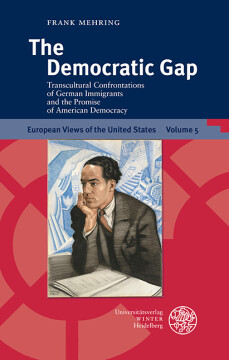
BUCH
The Democratic Gap
Transcultural Confrontations of German Immigrants and the Promise of American Democracy
European Views of the United States, Bd. 5
2014
Zusätzliche Informationen
Bibliografische Daten
Abstract
Why has the promise of American democracy been so persuasive to immigrants despite prejudice regarding cultural inferiority, a history of slavery and genocide, violations of human rights, media manipulations, and imperial self-righteousness? How can we analyze, understand, and evaluate the response patterns of immigrants, which evolved after the shock of arrival in the United States and the encounter with severe democratic shortcomings? This book investigates patriotic dissent of naturalized German immigrants to overcome what I call “the democratic gap,” namely the discrepancy between democratic ideals and practices. By turning to six force fields (abolitionism, female emancipation, cultural pluralism, patriotic performance culture, the civil rights movement, and Holocaust consciousness), a comparison of democratic criticism between German immigrants and African American writers reveals the underlying premises of transcultural confrontations and hidden motives behind declarations of Americanness. The response patterns discussed are also relevant for other immigrant groups such as Asian Americans, Arab Americans, or Hispanic and Latino Americans.
Inhaltsverzeichnis
| Zwischenüberschrift | Seite | Aktion | Preis |
|---|---|---|---|
| Table of Contents | VII | ||
| Preface | IX | ||
| List of Publications under the Auspices of the European Association for American Studies | XIII | ||
| List of Illustrations, Musical Examples, and Color Plates | XVII | ||
| Acknowledgment | XXI | ||
| Introduction | 1 | ||
| I Transcultural Confrontations | 13 | ||
| (Dis)continuities: Re-evaluating the German-American Experience | 13 | ||
| Who Are We/They? National Identity, Patriotism, and Democracy | 31 | ||
| Nation qua Thing: Response Patterns to the Democratic Gap | 40 | ||
| Thrills of Citizenship: German Declarations of Americanness | 49 | ||
| II Unconditional Abolitionism: Charles Follen | 59 | ||
| Great Expectations: Freedom, Equality, and Fraternity | 63 | ||
| Foreign Meddlers: Between Integration and Dissent | 75 | ||
| Revolution or Reform: Charles Follen and David Walker | 84 | ||
| Summary | 94 | ||
| III Declarations of Emancipation: Ottilie Assing | 99 | ||
| Children of the Failed Revolution: Transatlantic Political Activism | 104 | ||
| Neither Pariah nor Parvenu: Between Domesticity and Independence | 113 | ||
| Performing Emancipation: Ottilie Assing and Sojourner Truth | 131 | ||
| Summary | 146 | ||
| IV Transcultural Pluralism: Winold Reiss | 149 | ||
| Inter-Cultural Fault Lines: American Vistas in Germany | 153 | ||
| Transcultural America: A Plea for Color | 165 | ||
| Unfinished Democracy: Winold Reiss and Alain Locke | 180 | ||
| Summary | 195 | ||
| V Staging Americanness: Kurt Weill | 197 | ||
| Self-Americanization: Performing the “Self” as “Other” | 202 | ||
| Imaginary Spaces: Patriotic Musicals | 223 | ||
| Theatricality of “America”: Kurt Weill and Langston Hughes | 234 | ||
| Summary | 251 | ||
| VI Afro-German-American Dissent: Hans J. Massaquoi | 255 | ||
| Afro-German Vistas: The Racial Dilemma of Recognition | 260 | ||
| Transatlantic Double V: Politics of Afro-German Recognition | 271 | ||
| Nazi Jim Crow: Hans J. Massaquoi and Malcolm X | 285 | ||
| Summary | 297 | ||
| VII Holocaust Consciousness: Hannah Arendt | 301 | ||
| Unmasterable Future? Jewish-German Identity and the Fiction of Fascism | 307 | ||
| For the Sake of Freedom: Nay-Saying in the Shadow of the Holocaust | 316 | ||
| Transatlantic Traumas: Hannah Arendt and Toni Morrison | 336 | ||
| Summary | 352 | ||
| Conclusion | 355 | ||
| Bibliography | 363 | ||
| Archives | 363 | ||
| Musical Scores | 363 | ||
| Primary German American Literature | 364 | ||
| Secondary Literature | 367 | ||
| Filmography | 396 | ||
| Index | 397 |


 Publishing Platform by CloudPublish
Publishing Platform by CloudPublish